Effect of COVID-19 on Trucking Monopolizes 2020 Top 10 Stories
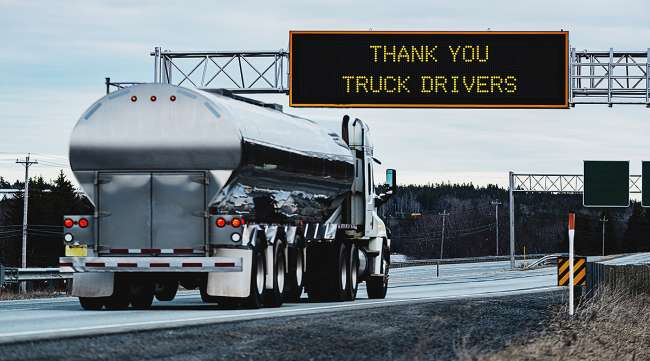
[Stay on top of transportation news: Get TTNews in your inbox.]
Here are the 10 most-read stories on the Transports Topics website in 2020, based on Google Analytics. It’s not shocking that the coronavirus pandemic dominated the headlines — eight of the 10 stories are related to it. The only story after the pandemic started to make the top 10 that is not connected to the disease hits on another hot topic within the industry: hours-of-service regulations. A pair of pandemic-related stories are positive, detailing how truckers were hailed as heroes for delivering essential items.
MORE YEAR IN REVIEW: Stories, charts, videos.
No. 1: FMCSA Issues COVID-19 Waiver for Truck Drivers With Learner Permits
By Eric Miller, Senior Reporter
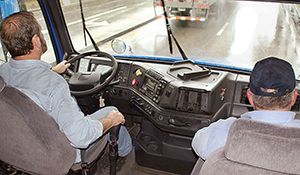
A student trains behind the wheel with his instructor. (Roadmaster Drivers School)
Federal trucking regulators have issued a three-month waiver that will allow truck drivers with commercial learner permits to operate during the COVID-19 emergency without a commercial licensed driver in the front seat of the cab, provided the CDL driver is in the truck.
The waiver also requires that the driver with the learner permit has evidence that he or she has passed the CDL driving skills test.
Noteworthy: This story from March 31, right as the pandemic was really beginning to grip the country, generated more than 20,000 more views than the No. 2 story.
No. 2: Trucking Not Immune From Worries Over COVID-19
By Roger Gilroy, Senior Reporter

John Sommers II for Transport Topics
For fleets, COVID-19 portends worse news in a freight market that already was slowing, executives said, as businesses urge their staffs to work from home and consumers withdraw from daily activities.
Marquee gatherings for truckers, sporting events and theater attractions have been postponed while schools have resorted to remote learning in efforts to slow the rate of the coronavirus, now a pandemic.
“These things, combined with a freight market that was already stuck in a rut before the coronavirus hit, will delay its potential to rebound even longer,” said Riley Larson, general manager at JMS Transportation Inc., a dedicated contract, regional truckload and brokerage services company in Cedar Rapids, Iowa.
Noteworthy: Though certain sectors of the freight market have performed well during the COVID-19 pandemic due to the need for essential supplies, this story from March 12 shows the fears about what a partial economic shutdown would do to other sectors of trucking.
No. 3: FMCSA Announces Two-Year Delay of Its Entry Level Driver Training Rule
By Eric Miller, Senior Reporter
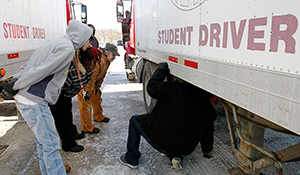
John Sommers II for Transport Topics
Compliance for a long-awaited rule intended to ensure that new drivers meet minimum training requirements before receiving their commercial driver licenses has been delayed for two years.
The Entry Level Driver Training rule — originally set to go into effect Feb. 7 — is delayed until Feb. 7, 2022, the Federal Motor Carrier Safety Administration announced Jan. 29 in an interim final rule.
Noteworthy: This story from Jan. 29 is the official notice that FMCSA was delaying implementation of the ELDT rule. The trucking industry had knowledge by the end of 2019 this was going to happen, and in fact, the No. 1 story in 2019 was about how FMCSA was preparing its formal notice of the delay.
No. 4: How Truck Stops Are Serving Truckers While Keeping Them Safe
By Transport Topics

A Love's location in Abilene, Kan. (Love's Travel Stops and Country Stores)
The nation’s truck stop chains and travel centers are working hard to remain open and serve drivers during the coronavirus crisis, while also taking steps to ensure safety. However, services are reduced in many cases.
In addition, the Customized Logistics and Delivery Association has advice from its members on how to protect the supply chain and the health of the workers involved. For drivers it includes spraying the interior passenger space of their vehicle with a disinfectant at the beginning and end of the day.
Noteworthy: This story took a look at how some of the most well-known truck stops and travel centers were dealing with navigating the pandemic and allowing truckers to continue to use their services, albeit in a different way.
No. 5: FMCSA Grants Limited Exemptions for Expired CDLs, Medical Cards
By Eric Miller, Senior Reporter

WendellandCarolyn/Getty Images
The Federal Motor Carrier Safety Administration on March 24 issued a formal notice that it will not take enforcement action for certain expired commercial driver licenses, learner permits and medical certifications through June 30.
“Many States are experiencing greater-than-normal employee absences or have closed offices of their state driver licensing agencies in response to the guidance from the U.S. Center for Disease Control to use social distancing to reduce the spread of COVID-19,” the policy statement said. “Because of these actions, many commercial motor vehicle drivers are unable to renew their driver’s license and are unable to provide medical certificates to their state driver licensing agencies.”
Noteworthy: Throughout the pandemic, FMCSA has tried to make it easier to keep truckers on the road to support the country. This notice applied to CLP holders, CDL holders and non-CDL drivers whose license was valid on Feb. 29, 2020, and expired on or after March 1, 2020.
No. 6: How America Is Thanking Truckers During the Coronavirus Crisis
By Transport Topics
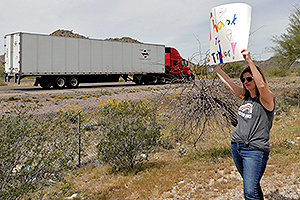
Megan Lyndberg thanks truckers during a free lunch giveaway March 31 at a rest area along Interstate 10 in Sacaton, Ariz. (Matt York/Associated Press)
As America grapples with the coronavirus and daily life is altered, the nation’s truck drivers are among those who are risking their personal health and doing the hard work to keep products moving to stores, hospitals and elsewhere. And their effort is being recognized.
Many users on social media are using the hashtag #ThankATrucker to send their message.
Noteworthy: A positive to come out of the pandemic is how many people realize how much they depend on truck drivers. Some consumers used to take it for granted when seeing their favorite products and essential goods on grocery store shelves, but that isn’t the case as much now. Truckers have expressed that they appreciate the gestures of gratitude, but also that they are just doing their jobs. The #ThankATrucker campaign is still going strong across social media.
TRUCKS BRING EVERYTHING. #ThankATrucker https://t.co/5xaIzG6QC4 — Amanda Schuier (@ASchuier) December 13, 2020
No. 7: UPS, Teamsters Agree on Sick Leave as Coronavirus Spreads
By Dan Ronan, Associate News Editor
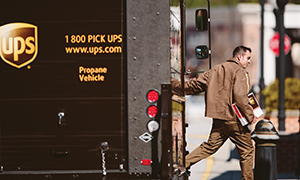
UPS Inc.
UPS Inc. said it is taking steps to protect its employees from contracting the COVID-19 virus and that it reached an agreement with the International Brotherhood of Teamsters concerning paid-leave guidelines for unionized workers who are affected by it.
UPS said the paid-leave agreement applies to about 300,000 full- and part-time hourly employees, primarily drivers, package handlers and mechanics, if they should become directly impacted by the novel coronavirus.
The union said the agreement would provide paid leave for any worker who is diagnosed with COVID-19 and is required to be quarantined, or who is isolated due to a family member’s illness.
Noteworthy: This story from March 23 shows the steps companies began to take to protect their workers from COVID-19. USPS, FedEx and Amazon also announced measures related to the safety of their employees and customers.
No. 8: Trump Praises Trucking Industry’s Pandemic Response at White House Event
By Eugene Mulero, Senior Reporter

The ATA Interstate One truck and a FedEx Ground truck at the White House event in April. (Evan Vucci/Associated Press)
President Donald Trump praised truck drivers during an April 16 White House event attended by men and women who have taken to the nation’s roads to deliver supplies that Americans need to manage through the COVID-19 crisis.
“Thank God for truckers,” Trump said from the White House lawn, flanked by two trucks and four commercial drivers. Also in attendance were Secretary of Transportation Elaine Chao and American Trucking Associations President Chris Spear.
Noteworthy: This April 16 event placed truck drivers in the spotlight as American heroes, as their continued efforts during the pandemic were recognized. Two trucks were parked next to the White House: ATA’s Interstate One truck and a FedEx Ground truck.
No. 9: FMCSA Issues HOS Relief for Coronavirus Assistance
By Eleanor Lamb, Staff Reporter
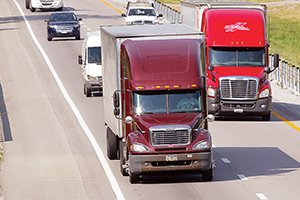
John Sommers II for Transport Topics
The Federal Motor Carrier Safety Administration has relaxed certain hours-of-service regulations for motor carriers involved in coronavirus-related relief efforts. The declaration, issued shortly after President Donald Trump on March 13 declared a national emergency in response to the virus, marks the first time FMCSA has granted nationwide relief. In the past, the agency has issued this kind of relief in certain regions as a response to specific weather events, such as hurricanes Dorian and Michael.
Noteworthy: This story was published March 14. Since then, FMCSA has extended the emergency declaration multiple times. Most recently, in early December, FMCSA announced the declaration had been expanded to offer relief to truckers involved in transporting COVID-19 vaccines.
No. 10: FMCSA Publishes Final HOS Rule, Granting Flexibility to Drivers
By Eleanor Lamb, Staff Reporter

5m3photos/Getty Images
The Federal Motor Carrier Safety Administration has published its long-awaited final rule on changes to hours-of-service regulations in a move intended to increase flexibility for truck drivers.
The final rule, announced by Transportation Secretary Elaine Chao and FMCSA Acting Administrator Jim Mullen on May 14, includes four revisions that pertain to issues truckers have voiced concerns about, such as the 30-minute rest break and splitting up time in the sleeper berth.
Noteworthy: FMCSA released its anticipated final rule on hours-of-service regulation changes May 14. It went into effect Sept. 29. ATA called the final rule “a good step in the right direction.”
Want more news? Listen to today's daily briefing:
Subscribe: Apple Podcasts | Spotify | Amazon Alexa | Google Assistant | More

